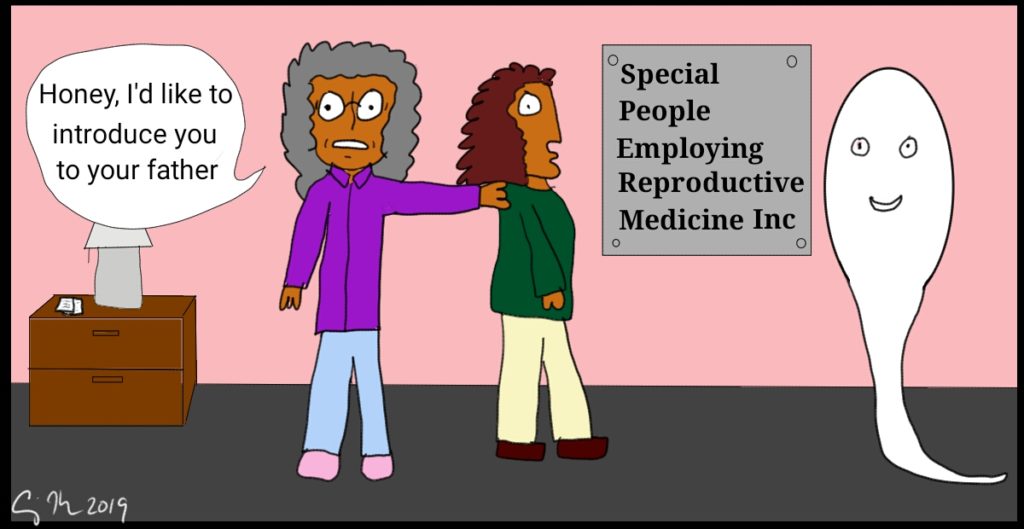by Nanette Elster, JD, MPH
A recent article in Stat News decrying the end of donor anonymity in sperm donation due to consumer genetic testing sparked my attention. In the spirit of full disclosure, I am the parent of an adolescent through anonymous sperm donation and have written and spoken extensively on this topic for over 20 years. So, in reading the Stat News article as my curious, internet savvy teen has begun her own journey of discovery about her genetics, I could not help but think, “FINALLY.” This is something I have expected with the advent of genetics and . . . because secrets rarely stay secrets. Realizing the nature of secrets is important given that those who inadvertently learn of their donor conception or are informed later in life “report feeling angry, not about their means of conception but about being deceived by their parents and the medical profession.”
For decades, the stigma and shame around infertility, single-parenthood and same sex parenthood has driven the use of donor gametes underground. This secrecy took and takes two forms: the secret about how the child is conceived and the secret about who the donor is. Why? If we are told to be ashamed of how our children are conceived, is this not the same thing as saying we should be ashamed of our children? And why should donors be embarrassed? After all, but for their assistance many loving families would not exist. I never understood the admonition to shroud the use of donor gametes in a veil of secrecy. Adoption has made it clear that children, especially as children become adults, are curious about who they are and where they come from. In addition to the psycho-social need for this information, medical need may also necessitate having a clear “family history.” Medical intake forms regularly ask for information about paternal and maternal family history. If one fills that out with the information erroneously, imagine the potential health consequences.

While donor anonymity may have been necessary a century ago when Dr. William Pancoast performed the first artificial insemination, times have changed. Families have changed. Information access has changed. The practice of medicine has changed. The American Society for Reproductive Medicine (ASRM) recognizes those changes. In an updated Ethics Committee Report, ASRM recommends that:
“Programs should caution participants that policies related to information sharing are not guaranteed since laws or individual circumstances change and that there is a possibility they may be contacted by offspring in the future. Similarly, maintaining anonymity of parties cannot be guaranteed since commercially available genetic testing and agencies that allow dissemination of identifying information through social media increases the risk of inadvertent disclosure of participants.”
Disclosure to the child and donor anonymity are two separate issues but are confounded by this panic over the potential demise of donor anonymity. Consumer genetic tests that reveal ancestry may make finding a donor or their family one simple click away. This is unnerving for those who have not shared with their friends, family or child the nature of the child’s conception or even to a donor who may not have shared with his own family, friends or children. But, the genie is out of the bottle and now the question is how to best support the many people who may be impacted by a problem of our own making.
The loss of donor anonymity, however, is clearly not without its challenges, including whether this will reduce the number of donors willing to provide gametes so others can become parents. This is, in part, because of the lack of disclosure to the offspring of how they were conceived. I cannot help but wonder if the stigma was eliminated, and gamete donation was a socially accepted form of family building, would donors be daunted by one day coming face-to-face with their progeny? Would parents have a fear of losing status as mom or dad? If donors were adequately informed of this possibility as part of making an autonomous choice to donate might they be able to take pride in their decision? Wouldn’t it be more sensible to figure out how to deal with these complex genetic webs rather than condemning the curiosity of donor offspring? I love my daughter and have no regrets about how she came into the world. As for finding her donor, I agreed in accepting his donation to an anonymity, but I did not agree for my child.
She is less than a year away from being an adult, and as such, can make her own choices about what is best for her. And, as for my donor, I am incredibly grateful to him and hope that he has never once felt ashamed of helping me build my family.